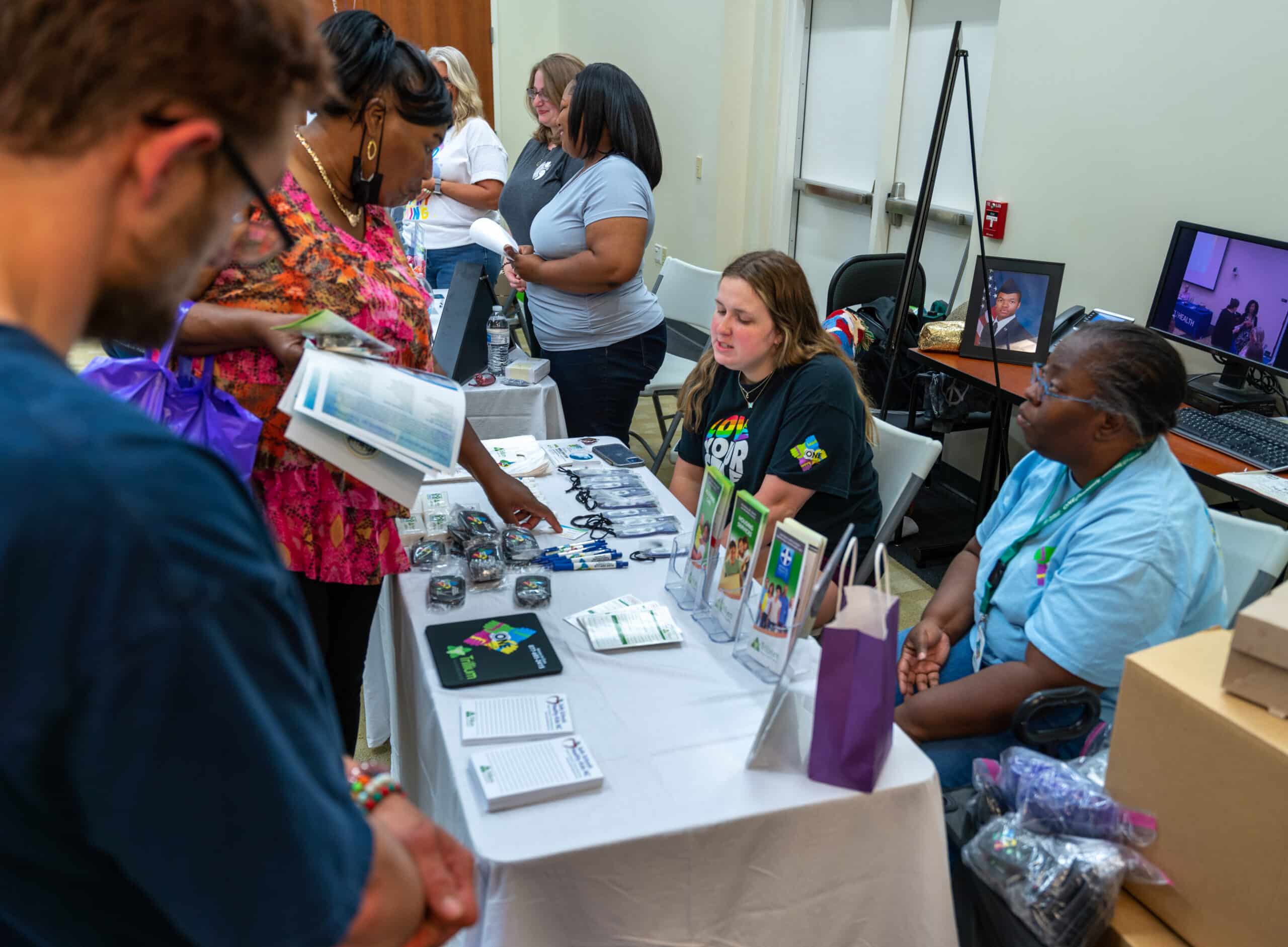Youth across the state now have better access to mental health services as part of the expansion of the North Carolina Statewide Telepsychiatry Program (NC-STeP), an initiative of East Carolina University’s Center for Telepsychiatry.
Five pediatric primary care sites from the mountains to the coast are providing mental health care for children and adolescents through NC-STeP-Peds. Catawba Pediatric Associates, PA; Clinton Medical Clinic; ECU Pediatrics Clinic; Robeson Pediatrics; and Surf Pediatrics have joined the NC-STeP-Peds network. Once contracts are final, Peachtree Pediatrics in Cherokee will be established as the final of six sites.
NC-STeP-Peds is funded by a $3.2 million investment from the United Health Foundation (UHF). It continues the foundation’s commitment to work with ECU to address mental health challenges in North Carolina and provide mental health care services to children and adolescents in rural and underserved parts of the state.
Dr. Sy Saeed, director of the ECU Center for Telepsychiatry and founding executive director of NC-STeP, said the program offers an innovative approach to providing mental health services through expert consultation support for pediatricians and other clinicians through telemedicine. The model provides integrated care closer to home and deploys several technological innovations.
Each participating practice has a space within the clinic where patients meet virtually with a licensed clinical social worker (LCSW) for therapy sessions. Patients referred for psychiatric care will meet virtually with the psychiatrist in the same space.
“Telepsychiatry is a viable and reasonable option for providing psychiatric care to those who are currently underserved or who lack access to services,” Saeed said. “NC-STeP is also helping address a pressing and difficult challenge in the health care delivery system today with the integration of science-based treatment practices into routine clinical care. We are able to provide telehealth appointments for therapy with a licensed clinical social worker and psychiatric care at their pediatric clinic.”
The initiative’s virtual reality component, “NC Rural Kids Get Well,” has been created by Dr. Yajiong “Lucky” Xue, the Robert D. Teer Distinguished Professor in the Department of Management Information Systems, and students in the ECU College of Business. It provides a 3D community on the Roblox platform to serve three main purposes: education, peer support and surveillance.
Participating pediatricians are beginning to see results from the initiative in their practices.
Dr. Katie Lowry ’00, a pediatrician at Robeson Pediatrics, witnessed her hometown of Lumberton suffer two 100-year floods and the COVID-19 pandemic within a five-year span. She said the emotional impact resulted in increased anxiety and depression among her pediatric patients.
“We still have a long time to kind of get out of those difficulties that they were in,” she said. “Before we were able to get access to NC-STeP and provide that here in our office, we had maybe 150 on our waitlist for counseling.”
Lowry said being part of NC-STeP-Peds brings counseling and psychiatric care into her practice where children and their families are comfortable receiving health care.
“I think the biggest thing is [NC-STeP-Peds] has absolutely just crushed the stigma barrier,” Lowry said. “They’re receiving care in a place that they always receive their care. They don’t have to go to another facility. They don’t have to drive another hour. It’s right here for them, and that has been amazing for our patients.”
Overwhelming need
Dr. Christian Lige, a pediatrician at Surf Pediatrics in Dare County, said NC-STeP-Peds provides more timely care and is an avenue for providing more collaborative care for his patients. Prior to NC-STeP-Peds, the number of patients needing access to mental health services was overwhelming.
His practice sees patients from Dare and four surrounding counties. NC-STeP-Peds allows Lige to connect his patients to care more quickly. Lige said before NC-STeP-Peds, it could have taken nine months to a year to have an appointment with a psychiatrist.
“It’s really difficult to wait to see a psychiatrist for a year when a kid is struggling,” Lige said. “I’m hoping that with us talking with the psychiatrist, with our nursing staff and with the social worker, we’ll have a better picture of what’s going on with the patient.”
Through NC-STeP-Peds, Lige’s patients have their first virtual appointment with a behavioral health manager within weeks. The assessment determines if a psychiatric appointment is needed, and a virtual appointment with the NC-STeP-Peds psychiatrist follows in a few weeks.
“We see quite a few kids who go off and get admitted to a hospital because of an issue. They leave here and they’re on no medicines and they come back on four medicines. For a primary care doc to take care of four psychiatric medications is difficult,” Lige said. “So, we’ve had the ability now to speak to a psychiatrist so we can get input from them on the medicines and interactions, and that’s been very helpful.”
Assessing needs
In the 10 months since the sites launched more than 10,000 children and adolescents have been screened for mental health issues. Saeed said the screenings indicated more than 1,000 had demonstrated an increased likelihood of a behavioral health disorder and 1,800 had demonstrated at least a “mild to moderate” level of anxiety.
“Our ability to screen a large number of children since the program’s inception helps increase awareness of mental health issues in children and emphasizes the importance of addressing these concerns in these communities,” he said. “We currently have more than 200 children and adolescents receiving integrated behavioral and primary care services as part of the program.”
Paula Bowen is one of three LCSWs hired through the UHF grant for NC-STeP-Peds. As a behavioral health manager for the program, Bowen reviews referrals from the pediatric sites and holds virtual intake appointments with the patients and families.

“We’re available to diagnose, make referrals to the psychiatrist and [provide] therapy for the children,” Bowen said. “NC-STeP has increased availability to therapy for kids. We can provide a lot of education [for the families]. Even basic mental health education can go a long way to help parents and their children.”
Saeed said NC-STeP-Peds addresses mental health needs at a critical stage. A recent JAMA Pediatrics study of an estimated 46.6 million U.S. children showed that the national prevalence of children with a treatable mental health disorder who did not receive needed treatment or counseling from a mental health professional was 49.4%. In North Carolina, that number was 72.2%.
Much of that has to do with a shortage of mental health providers — 94 out of 100 counties in North Carolina are designated as mental health professional shortage areas, Saeed said.
“For a young person with symptoms of a mental disorder, early treatment can help prevent persistent and more severe problems later in life,” he said. “Thanks to UHF, ECU is doing everything we can to prevent that through NC-STeP-Peds.”
Updated June 19, 2024
A beam adorned with signatures from ECU Health team members, behavioral health care teams, leadership and the Thomas Construction team was raised into place at the site of the upcoming behavioral health hospital in Greenville.
The beam raising served as a backdrop for an event showcasing the construction progress of the new 144-bed behavioral health hospital, a partnership between ECU Health and Acadia Healthcare, slated to open in summer 2025. ECU Health and Thomas Construction team members paused their important work to witness the historic milestone.
Glenn Simpson, service line administrator for behavioral health at ECU Health, said this event was another historic step, celebrating about 15 years of work to bring a behavioral health hospital into the ECU Health system to serve eastern North Carolina.

“Today is only the beginning of so much excitement around this facility,” Simpson said. “We couldn’t be more excited to be partnered with Acadia Healthcare and working with Thomas Construction to build this facility. This is all allowing us to offer outpatient services, specialty services that we cannot provide today and we’ll be able to treat a population of children and adolescents who used to have to drive over 70 miles for inpatient treatment.”
Mary Branch-Ellis, a registered nurse with the behavioral health team at ECU Health Medical Center, has been with the system for 41 years. She said she was working at the former Pitt County Memorial Hospital years ago when the behavioral health unit first opened in the 1980s.
She said seeing the facility come together is something she will never forget and she’s glad eastern North Carolinians in need of the services will have everything under one roof.
“It’s just wonderful to be a part of this as someone who is invested in this work in eastern North Carolina,” Branch-Ellis said. “I’ve worked so many years in mental health and been an advocate for patients and now we’re seeing this state-of-the-art facility being built and it’s a wonderful experience to see these beds – which we need – opening up. I’m excited to see it coming to Greenville and I’m proud to be a part of it.”
ECU Health team members sign beam slated for upcoming behavioral health hospital
Recently, ECU Health team members had the opportunity to leave their mark on the upcoming state-of-the-art, 144-bed behavioral health hospital in Greenville, slated to open in 2025.
The Thomas Construction team brought a beam, which is slated to be installed in the hospital’s gymnasium, to ECU Health Medical Center for team members to sign. More than 100 team members signed the beam and many signatures will be visible in the gymnasium even after construction is complete.
Amy Albritton, a recreational therapy assistant in Behavioral Health Services, has been with the system for more than 25 years. She said it’s special for her to see the plans for the new hospital come together after her years on the unit.
“I think being able to see the beam and sign it helps make it a little more real,” Albritton said. “It’s been talked about for a while now but having this here that we can touch, it’s a really exciting time. I’m just glad to be a part of it.”

Glenn Simpson, service line administrator for behavioral health at ECU Health, said engaging team members in the lead up to the hospital opening is a great opportunity for education and building excitement.
“With building a brand-new hospital, it’s special to give our team members the opportunity to be part of the history of that by signing one of the beams,” Simpson said. “When they’re finished with the gymnasium part of the structure, they’ll be hoisting the beam into the framework. This is great for team members to sign the beam and know that their name will forever be a part of that hospital.”
Renderings of the upcoming hospital were also on display during the beam signing to allow team members to see the plans again. The beam was in the hospital for about a week before being returned to the construction site.
To learn more about new behavioral health hospital, please visit: ENCBehavioralHealth.org
Resources
ECU Health welcomed more than 50 exhibitors and 100 guests to the 12th annual Mental Health Expo designed to connect community members with important resources on mental health and substance use.
The expo, held at Eastern AHEC in Greenville, was a free event for individuals, family members, caregivers and providers. Three featured presentations from experts covered various mental health and addiction topics.
Duania Roberts with the behavioral health team at ECU Health Medical Center gave a presentation titled “Balanced Being” which tackled stress reduction techniques. James Lally, a certified holistic Registered Nurse at ECU Health Medical Center, spoke on understanding the nervous system to better understand yourself.

Dr. David Ryan, an obstetrician-gynecologist with ECU Health as well as a clinical assistant professor of Addiction Medicine at Brody School of Medicine at East Carolina University, presented on “Turning the Tides of Addiction.” There, he spoke on reducing stigma around addiction and understanding it as a disease. He said it’s also crucial to be familiar with and break down stigmas associated with life-saving medications for addiction treatment.
He said events like the Mental Health Expo help communities understand what is happening around them when it comes to mental health and substance use.
“There has been a lot of shame and a lot of discomfort talking about mental health,” Dr. Ryan said. “I think the fact that we’re able to have these conversations at an event like this helps us reduce the stigma and bring these issues to the surface.”
Glenn Simpson, service line administrator for behavioral health at ECU Health said getting exhibitors to come together in one place for the event is vital for the community to take in all the resources available to them in eastern North Carolina.
“This is really what we need – what this community needs,” Simpson said. “We have providers here. We have Trillium Health Resources, which manages Medicaid and does so much to provide resources to this region. We have the 988 Helpline team here. If someone needs some help with behavioral health and they don’t know who to call, just pick up the phone or text 9-8-8.”
He also said it was an exciting opportunity to share information about the upcoming state-of-the-art, 144-bed behavioral health hospital in Greenville, slated to open in 2025.
Lillie Malpass, executive director of the Pitt County Coalition on Substance Use, participated with her organization in the event and said it was a great opportunity to connect with more community members and other organizations.
“Even among other organizations, we’re getting connected with other great organizations and learning what they do and they’re learning about what we do – that’s so important,” Malpass said. “It’s about exchanging information and getting out of our silos – we’re prevention and meeting with recovery organizations, treatment organizations – it’s great to come together and see how we can all work together.”
Resources
With construction underway on the future site of a state-of-the-art, 144-bed behavioral health hospital in Greenville, ECU Health’s Behavioral Health team visited the site for a mental health safety discussion with Thomas Construction.
ECU Health’s service line administrator for Behavioral Health Glenn Simpson visited the construction site during National Safety Week in the construction industry. This year, the focus is on mental health.
Simpson said one in five adults will experience a mental illness, and the construction industry has one of the highest rates of suicide in the nation, where 53 of every 100,000 workers in the United States die by suicide. That rate is four times greater than the national rate.
He said it’s as important to checking in on your own mental health as it is to check in on those around you.

“The construction industry especially has an extremely high rate of suicide. We know that it’s tough work that they’re doing,” Simpson said. “We’re so grateful for Thomas Construction, not only for the work they’re doing here at the site but for inviting us out for this discussion today. The message is important for everyone, but especially for this group here. It’s OK to reach out and ask for help.”
During the event, breakfast, t-shirts and mental health resources were distributed to the Thomas Construction team.
Chris Thorn, a health care team leader for Thomas Construction, helped set up the event. He said between National Safety Week, Mental Health Month and the team building a behavioral health hospital, the opportunity to hear from a professional and share resources worked perfectly.
“It can be a sensitive topic, especially in the construction industry, but ignoring mental health is not an option,” Thorn said. “These conversations are important for us to keep things moving in a more positive direction for our industry and letting our people know they have resources available to them.”
Simpson agreed and said it’s important to normalize conversations around mental health to reduce stigma.
“There’s still so much stigma attached to mental illness and substance use disorders,” Simpson said. “The more we can educate and make people feel OK about talking about those things, the greater impact we’ll have on turning some things around.”
During the event, Simpson promoted the 988 Suicide & Crisis Lifeline as well, which offers 24/7 access to trained crisis counselors who can help people experiencing mental health-related distress.
The lifeline is available nationwide and connects callers with a trained professional in the state from which they are calling. North Carolina residents contacting the 988 services are connected to a team in Greenville. The lifeline offers free and confidential support and can also help callers connect with nearby services.
Resources
ECU Health Behavioral Health Services
ECU Health, Acadia Healthcare host groundbreaking ceremony for new behavioral health hospital
ECU Health’s Eastern Carolina Injury Prevention Program (ECIPP), through funding by the North Carolina Department of Health and Human Services (NCDHHS), hosted a youth mental health conference for professionals across the state. The event, “Light the Flame: Igniting Hope for North Carolina’s Youth” drew over 250 attendees from a variety of professions including teachers, coaches, school counselors and mental health professionals.
Some of the topics covered included supporting the mental health and well-being of yourself and others, clinical assessment and intervention, safe firearm storage to prevent suicide by firearms, substance use, social media in connection to youth mental health.
“In our youth, suicide stands as the second leading cause of death, with a staggering 31% increase in suicide attempts in 2021,” said Dr. Shannon Longshore, medical director, ECIPP, pediatric trauma surgeon, ECU Health. “There’s an urgency in all of us who work with kids to find solutions and take care of them. We have to focus on prevention rather than recovery and treatment, and conferences like these can help us begin to move the needle.”
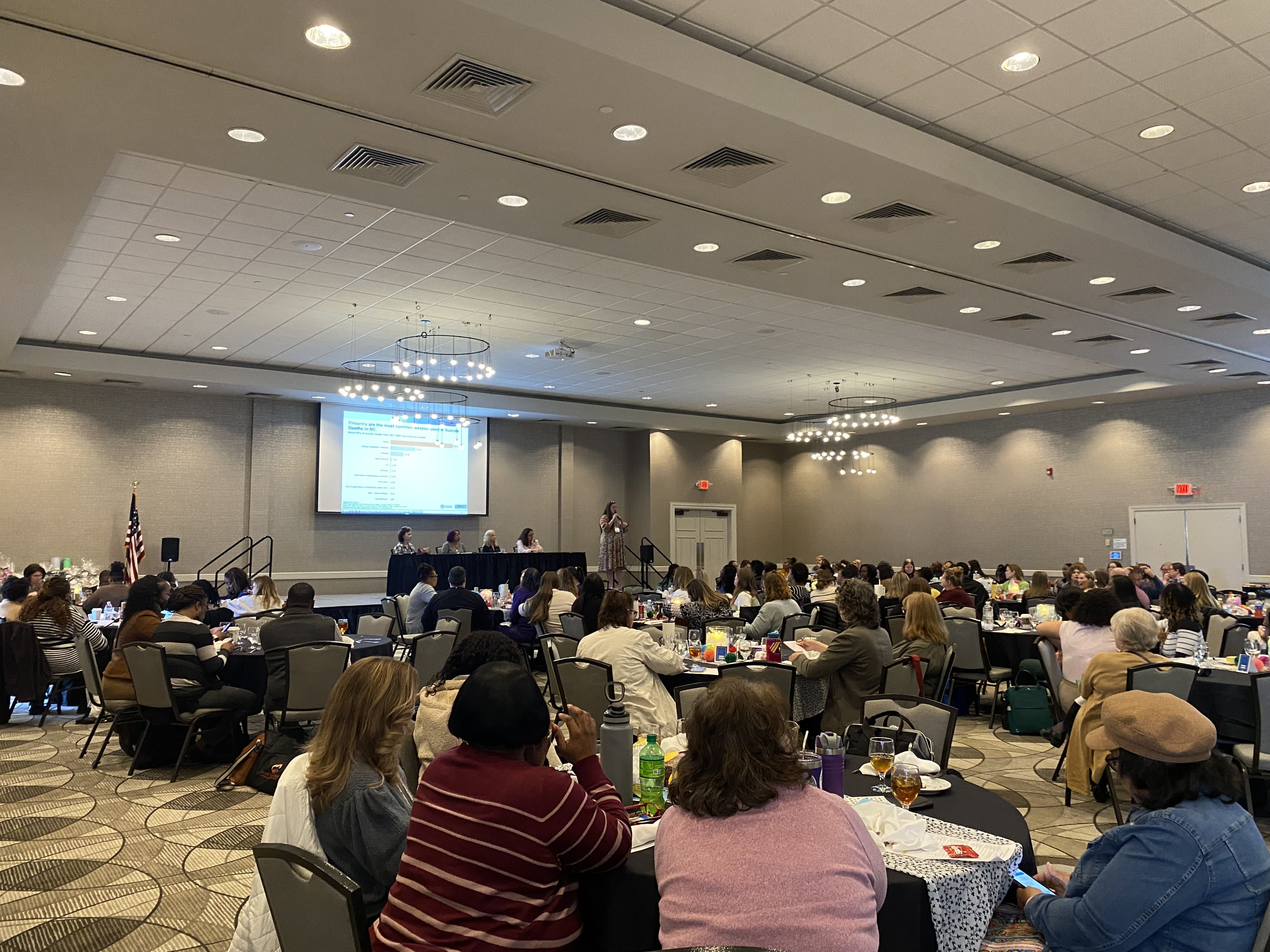
While the event drew attendees from across the state, most came from right here in eastern North Carolina.
“This is a great opportunity to provide further education and a chance for professionals from across the state to network and share experiences,” said Breanna Culler prevention coordinator, ECIPP. “Having this event in Greenville allows us the opportunity to bring resources home.”
Multiple vendors attended the event to connect attendees with resources, including Youth Mental Health First Aid, Rural Opportunities Institute, 988 Suicide & Crisis Lifeline, NC School Health Training Center, Resources for Resilience and more.
GREENVILLE, N.C. (November 1, 2023) – ECU Health and Acadia Healthcare held a ceremony today to celebrate the start of construction on its previously announced state-of-the-art, 144-bed behavioral health hospital in Greenville, North Carolina. The event occurred on the site of the new hospital – located at 2820 MacGregor Downs Road, Greenville, North Carolina 27834 – and celebrated the joint venture partnership between ECU Health and Acadia Healthcare, which will own and operate the new hospital together.
Slated to open in Spring 2025, the hospital will be a center of excellence situated less than a mile from ECU Health Medical Center. It will offer comprehensive inpatient and intensive outpatient treatment for adults, seniors, children and adolescents who struggle with acute symptoms of mental health such as anxiety, depression, bipolar disorder, post-traumatic stress disorder (PTSD), as well as treatment for co-occurring disorders. Thomas Construction Group is the general contractor, and Stengel Hill Architecture is the architect for the project.

“Too many people, including children, in North Carolina get stuck in emergency departments when they urgently need short-term and high-quality behavioral health care,” said North Carolina Department of Health and Human Services Sec. Kody H. Kinsley. “This new hospital will create lasting change in this region by making behavioral health services easier to access when and where they are needed.”
The new hospital will also serve as a teaching hospital for psychiatry, social work, nursing and other behavioral health professionals. This will address the shortage of clinical behavioral healthcare professionals in the area, training students and residents from the Brody School of Medicine at East Carolina University, many of whom will go on to practice in eastern North Carolina and carry forth ECU Health’s mission to improve the health and well-being of the region.
The hospital will include 24 inpatient beds specifically for children and adolescents with behavioral health needs. These beds will be the first of their kind in ECU Health’s 29-county service area and the only child and adolescent beds within 75 miles of Greenville, North Carolina.
“The shortage of mental health resources is a critical challenge in North Carolina,” said Dr. Michael Waldrum, chief executive officer of ECU Health and dean of the Brody School of Medicine. “We are pleased construction is underway for our new behavioral health hospital, and this moment marks another milestone in our effort to improve access to behavioral health care for the region. It will provide the hope and healing residents of Greenville and the surrounding communities need when dealing with complex behavioral health issues.”
Prior to the pandemic, nearly one in five North Carolinians were experiencing a mental, behavioral or emotional disorder, according to a report from the North Carolina Institute of Medicine’s Task Force on Mental Health and Substance Use. In the past three years, national data indicates a growing trend of depression and anxiety symptoms. This partnership demonstrates a commitment to addressing mental illnesses and substance use disorders, normalizing and treating them with the latest science and medicine in appropriate care settings.
“This new hospital will provide North Carolinians with expanded access to quality behavioral health services and treatment from specialized clinical teams in a carefully designed environment,” said Chris Hunter, chief executive officer of Acadia Healthcare. “We are so proud to be affiliated with ECU Health, working together to address the strong need in this area and building upon their legacy and commitment to behavioral health services. This hospital will be a strong member of the Greenville community, collaborating with all organizations, hospitals and first responders. It will be a beacon of hope for patients and families in eastern North Carolina.”
To learn more about the partnership between ECU Health and Acadia Healthcare, visit ENCBehavioralHealth.org.
Angela Lamson and Jennifer Hodgson began collaborating with Greene County Health Care nearly 20 years ago for an integrated care program to benefit patients in eastern North Carolina and provide valuable practical learning opportunities for their East Carolina University students. This began with one ECU medical family therapy student in 2006.
In the years since then, ECU’s partnership with Greene County Health Care focused on the delivery of behavioral and mental health services, in tandem with primary care visits, has flourished, including a recent high of 18 students across 12 sites.
All of the students who provide services with Greene County Health Care are rigorously trained for their position, ready to meet a variety of acute and complex needs for patients.
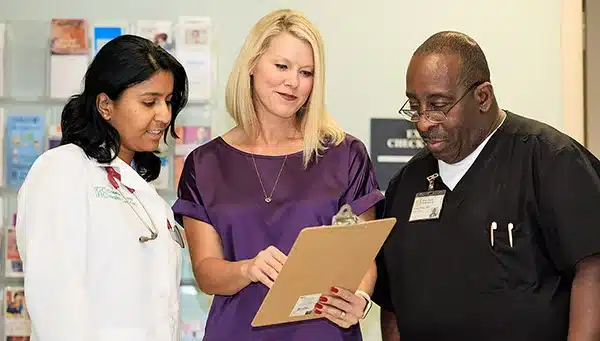
Collaboration is also reflected through Greene County Schools. During an appointment, a patient is informed about the integrated care model and asked if they would like immediate services or future services with a therapist on site.
Lamson said the students, in the College of Health and Human Performance based primarily in the Department of Human Development and Family Science and including the School of Social Work, have undoubtedly saved lives. Greene County Health Care CEO Melissa Torres has proof of ECU’s role in Greene County Health Care’s growth.
“For many years, ECU students were the only therapists providing mental health care in our clinics,” Torres said. “Over time, our partnership with ECU helped lay the groundwork for building our own behavioral health team. More therapists means more patients receive care.”
The first funding in 2006 came from the Kate B. Reynolds Foundation in partnership with Greene County Health Care. In 18 years, $4,105,762 has been secured and 154 students have received graduate assistantships to deliver integrated behavioral health care.
Greene County Health Care is celebrating 50 years this year and has five clinics offering medical, dental and mental health care covering a 17-county area.
Lamson, a Nancy W. Darden Distinguished Professor in HDFS and the university’s interim assistant vice chancellor for economic and community engagement, Torres and others have enjoyed seeing an uptick in the dental aspect and effectiveness in Greene and Pitt counties.
“One of our practice managers attributes the increase to three things: the students’ easy-going and approachable personalities, (Lamson’s) excellent rapport with our dental assistants and the students’ flexibility in approaching patients,” Torres said. “Our partnership with East Carolina University is a natural fit. East Carolina’s values are student-centered, inclusive and committed to service. Those values complement our mission and vision. Our mission is to provide compassionate, quality care, every day for all people. … The partnership gives ECU students an opportunity to learn about and serve their community as a whole, providing care to people who would otherwise not get the care they truly need.”
With mental health, Lamson said a major part of the development of student training focuses around an important question to patients — have you had thoughts of whether you would be better off dead?
“If you haven’t received training in how to ask that question and then what to do with the information, that can be really scary for the student and for the patient,” Lamson said. “What I have said time and again is I can promise you that our team is going to be ready to ask that question, and know what to do with the results. People need us to ask that question and many times, they want us to ask that question.”
National mental illness awareness week is Oct. 1-7. This year’s theme is “Together we care. Together we share.”
That is a fitting theme for what Lamson described as attempts locally to continue to reduce the stigma associated with discussing mental illness and suicidal thoughts.
“It needs to be a part of conversation, so we can really begin to make sure we are saving people’s lives,” Lamson said.
In 2005, ECU created the first doctoral program in the nation in medical family therapy. Many graduates have remained in eastern North Carolina for professional opportunities, which Torres said has helped patients of Greene County Health Care receive full care.
Alex Hernandez is a current ECU medical family therapy doctoral student who has embraced and benefited from his role with Greene County Health Care patients.
“Learning how the medical world works and how mental health is integrated into that world, this has been great and I’ve learned a lot, because it’s a huge learning curve,” Hernandez said. “It definitely prepares you. This is precisely what I want is doing therapy in the medical world, understanding that health is not just physical health or mental health. It is all of it together. That is what we practice and that is why we’re here.”
Seeing people collaborate and commit to this integrated care model has brought great pride to the co-creators of ECU’s medical family therapy doctoral program.
“The success of this collaboration and the integrated care services we have delivered across eastern North Carolina could not have been possible without the earliest vision and commitment of Dr. Jennifer Hodgson, and our partners, Dr. Tom Irons and Mr. Doug Smith, along with hundreds of devoted therapists, health coaches and our most current GCHC leadership,” Lamson said. “Most of all, this program could not have been possible without the patients who trusted our team for their care.”
ECU Health, local organizations, non-profits and other behavioral health and substance use groups came together on May 23 to host the 11th annual Mental Health Expo, which was in person for the first time since 2019.
Nearly 50 exhibitors saw groups and individuals come through as they answered questions and provided information about local mental health and substance use resources.
Glenn Simpson, ECU Health system service line administrator for Behavioral Health, said the opportunity to come back together in person was crucial for the event to connect with community members face-to-face.
“Most of us become accustomed to Zoom meetings and masking and not having that interpersonal relationship. As humans, interpersonal relationships are extremely important,” Simpson said. “Technology helped us with this event the last couple years but to be able to actually see people shake people’s hands, talk to them directly is really exciting.”
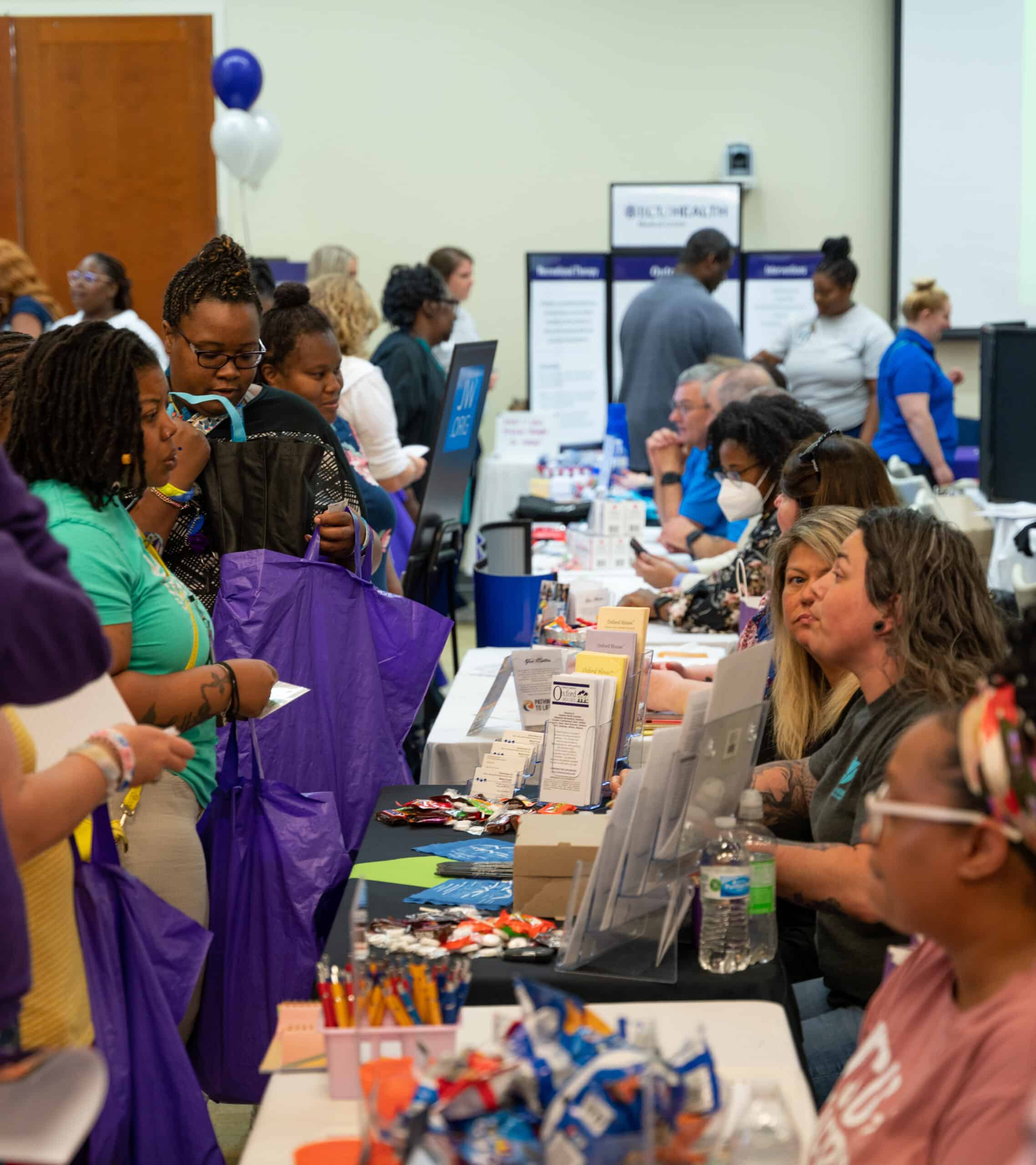
The event also included speakers presenting on a few different topics, including: “Mind Over Matter: Using Mindfulness to Assist with Treatment of Depression and Anxiety,” “Lay Responder Naloxone Training: When and How to use NARCAN Nasal Spray” and “Human Trafficking: Building Protective Factors for Prevention and Resiliency.”
Simpson said these “mini workshops” were helpful to give community members more information on topics that may be important to them.
Simpson also shared that this event would not be possible without the support of the community and the many organizations that came together to share information with eastern North Carolinians.
“There is help out there, you just kind of have to figure out how to get it,” Simpson said. “This event brings the exhibitors, agencies and the public together to share all of this information. I’ve already talked to a few people and realized I didn’t even know the agency existed and I’ve been doing this for a long time. It’s a real cool opportunity to learn what’s out there and I know the communities we collectively serve really benefit from that.”
The Walter B. Jones Center, located in Greenville, was one of nearly 50 exhibitors on hand for the Mental Health Expo. Team members from the center said the partnership with ECU Health is crucial and the opportunity to connect with community members in person is invaluable.
“It’s great to get the word out and to let people know what we do and let folks know how to get into treatment and get help when they need it,” Jade Butler, counseling supervisor at Walter B. Jones Center, said. “I think we have the same vision and goal in mind as ECU Health, to help as many people as we can with mental health and substance use issues. Having ECU Health Medical Center right here and us just down the road, I think we’re able to collaborate and be able to serve as many people as we can.”
Simpson said the event was also a great opportunity to help promote the 988 Suicide & Crisis Lifeline as well, which offers 24/7 access to trained crisis counselors who can help people experiencing mental health-related distress.
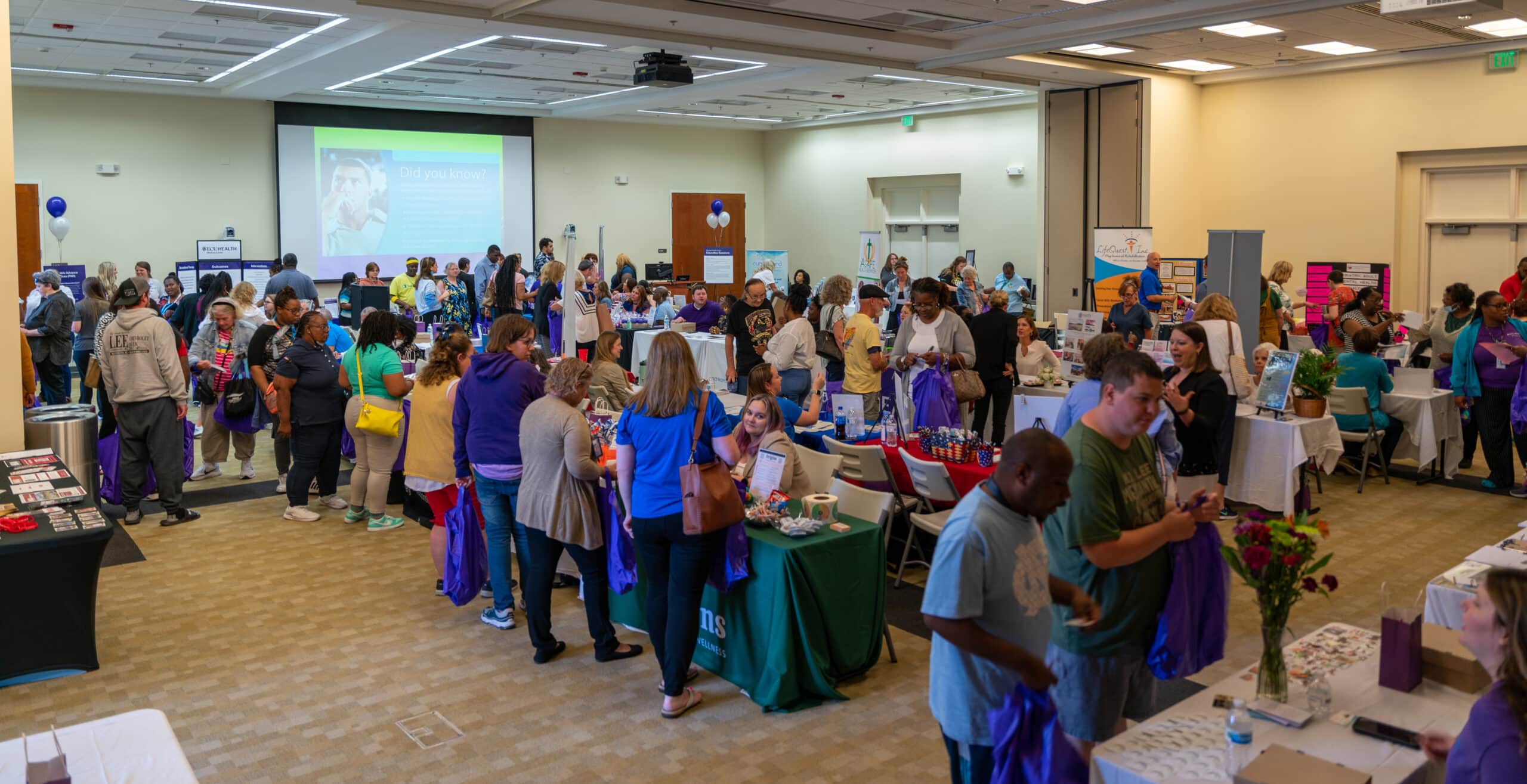
The lifeline is available nationwide and connects callers with a trained professional in the state from which they are calling. North Carolina residents contacting the 988 services are connected to a team in Greenville. The lifeline offers free and confidential support and can also help callers connect with nearby services.
Access to care was a frequent topic during the Mental Health Expo and Simpson shared that Medicaid expansion is an exciting development for those seeking behavioral health care. He added that the upcoming behavioral health hospital, slated to open in Greenville in spring 2025, is a major step in improving access for eastern North Carolina.
“We’re very excited to partner with Acadia,” Simpson said. “It’s going to be a state-of-the-art behavioral health hospital that will serve all ages. That’s all on top of what we’re already able to do today so it will be from children to senior citizens that need that level of care.”
ECU Health team members were on hand to share information on family services and important topics, like setting up a Psychiatric Advance Directive. The ECU Health team also shared information on MyChart and ECU HealthNow.
Mental health in the United States has been an ever-escalating problem for many years that has now become markedly worse due to the COVID pandemic. Fear, anxiety and isolation stemming from the pandemic exacerbated depression, substance abuse and even the incidence of spousal abuse.
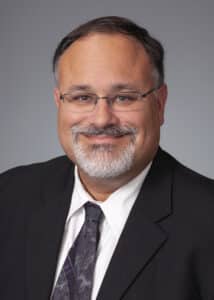
Dr. Michael Lang
In my role as chair of the Department of Psychiatry & Behavioral Health at the Brody School of Medicine and ECU Health, I have seen firsthand the impact a lack of mental health resources can levy on our most vulnerable citizens. Others in our community see and experience it as well, as evidenced by the large turnout and lively conversation at the Mental Health Town Hall hosted by the North Carolina Department of Health and Human Services in Greenville on Feb. 9. The themes and stories shared at the town hall were common, consistent and heartbreaking. I am grateful for the legislators and community members who came together to have an open, honest discussion and we all agree that urgent action is needed.
Emergency departments across the state are overrun with patients in psychiatric distress with few outlets available to provide them help. This has particularly been the case for patients with substance abuse disorders, our elderly and children. I personally have seen so many children in the emergency department that doctors had to treat other conditions in the waiting room. We owe our patients appropriate mental health services in a safe location with qualified professionals who are not only delivering excellent care but training the next generation of providers to take up the mantle of behavioral health care.
To that end, ECU Health’s partnership with Acadia Healthcare to build a new 144-bed freestanding mental health hospital here in eastern North Carolina is a step in the right direction. This facility, scheduled to open in 2025, will provide state-of-the-art care for not only the people of our region but also the entire state. The hospital will house distinct units that will be devoted to the care of specific populations of behavioral health patients. Included will be a geriatric unit, a substance abuse area, a space for those with significant co-morbid medical problems, the intellectually disabled and a 24-bed child/adolescent unit. Within its walls, every evidenced-based treatment available will be utilized to maximize our ability to rehabilitate, stabilize, and allow our patients successful community reentry.
Given the large number of disparate patients with varied diagnosis, the new behavioral health teaching hospital will serve as a training area for physicians, nurse practitioners, physician assistants, psychologists, occupational therapists, family therapists, substance abuse counselors and more. The hospital will be closely aligned with ECU Health Medical Center for access to the wide array of clinical and diagnostic resources our tertiary care center has to offer.
Our vision is for this facility to serve as a symbol of the commitment we at ECU Health and the Department of Psychiatry and Behavioral Medicine have to provide state of the art care for the people of eastern North Carolina. I am excited to form new partnerships and engage our community leaders to ensure that all citizens, whether they have schizophrenia or opiate use disorder, can live and prosper here in our wonderful region.
Michael Lang, MD, is chair of the Department of Psychiatry & Behavioral Health at the Brody School of Medicine and ECU Health.
Children and adolescents with mental health care needs will benefit from a $3.2 million partnership between East Carolina University and the United Health Foundation.
The grant will expand the North Carolina Statewide Telepsychiatry Program (NC-STeP) within the ECU Center for Telepsychiatry and e-Behavioral Health. The investment is part of the United Health Foundation’s ongoing commitment to working with ECU to address mental health challenges in North Carolina — this time with youth.
In joining leaders to announce the three-year partnership, North Carolina Gov. Roy Cooper highlighted the critical needs surrounding children’s mental health in the state.

“Not only do we need to pay attention to our health, but our mental health as well and we’re recognizing that more than ever,” Cooper said. “That’s why I am so excited that the United Health Foundation, Dr. Sy Saeed and ECU have come together to try to get mental health treatment to young people in a more efficient and better way.”
Cooper said the NC-STeP partnership between ECU and the United Health Foundation helps advance toward his mission for the state for people to be able to live healthier lives with opportunities of purpose and abundance. Cooper said residents of rural North Carolina know how hard it is to get access to health care. Telemedicine will help bring experts to people wherever they are throughout North Carolina.
“I’m excited about this project. There are going to be people’s lives improved and people’s lives saved because of it,” Cooper said.
Through this expanded program, NC-STeP will provide access to mental health services for children in their established pediatric or primary care setting, removing the stigma sometimes associated with mental health care, said Saeed, director of the ECU Center for Telepsychiatry and founding executive director of NC-STeP. Through telemedicine, the program will offer expert consultation support for clinicians.
“In North Carolina, children experience significant challenges accessing the care needed to address their mental health. More than 70% of children in North Carolina with a mental health disorder do not receive treatment, and 92 out of 100 counties in the state are designated as mental health professional shortage areas,” Saeed said. “A growing body of literature suggests that the use of telepsychiatry to provide mental health care has the potential to mitigate the workforce shortage that directly affects access to care, especially in remote and underserved areas.”
NC-STeP was established in 2013 and has completed more than 56,000 psychiatry assessments in hospital emergency departments and has served more than 14,000 patients in its 23-community primary care settings. The expansion will provide mental health care services to underserved children and adolescents in six community-based pediatric and primary care clinics in rural and underserved parts of the state.
U.S. Reps. Greg Murphy and Don Davis, who helped guide NC-SteP in the General Assembly, have continued to support the initiative in Congress.
“It’s the people with boots on the ground, the people who are actually taking care of patients who deserve most of the praise,” Murphy said. “Sy has been a lifesaver for many individuals.”
Murphy thanked United Health Foundation for funding the initiative that will help address the unique challenges of patients in rural areas.
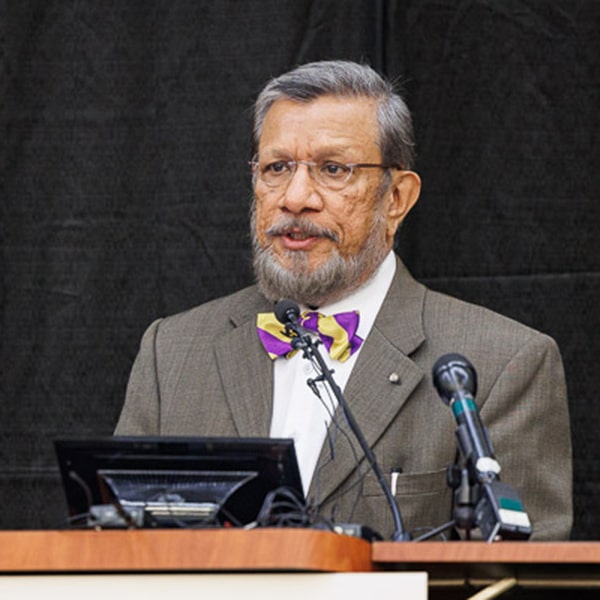
Davis emphasized the focus on children’s mental health as an important step in the effort to “provide every child a fighting chance to realize the American dream in eastern North Carolina. Dr. Sy has been a fearless voice in this effort,” Davis said.
“We’re honored and excited to partner with East Carolina University to address key health challenges our young people are facing,” said Anita Bachmann, CEO, UnitedHealthcare Community Plan of North Carolina, part of UnitedHealth Group. “By working together and creating an interconnected system of clinical and social services, we can continue to produce better health outcomes for North Carolinians.”
The United Health Foundation and ECU also partnered in 2020 through a $1.25 million grant to expand telepsychiatry services to address the mental health needs of expectant and new mothers. Through the Maternal Outreach Using Telehealth for Rural Sites (MOTHeRs) project, ECU developed and deployed a new obstetric care model for high-risk patients and addressed food insecurity among pregnant women.
North Carolina Health and Human Services Secretary Kody Kinsley touted the importance of access to health care — particularly mental health care services — in rural North Carolina.
“There is no health without mental health,” Kinsley said. “In particular, I think we know that mental health needs for children are more acute than ever.”
Kinsley said the investment announced today is a “win-win-win.” The project is being built on a program that has led statewide in expanded access to care.
“Truly it has been ECU driving access to telepsychiatry far before it was a fashionable thing,” Kinsley said.
Innovation is at the center of ECU’s initiatives fostering regional transformation in health care. ECU Chancellor Philip Rogers said the partnership with the university and the United Health Foundation allows many disciplines across campus to address the disparities in health care.
Rogers said the initiative would not be possible without the steadfast dedication and hard work of leaders at ECU, beginning with Saeed, who leads the team responsible for the operational aspects of the program.
“This transformative grant builds on our leadership in leveraging technology to provide care in the region and across the state,” Rogers said. “Our partnership with the United Health Foundation runs quite deep. This partnership has already made a significant impact as we prepare students to address the critical shortage of mental health professionals in our state.”
“Lucky” Xue, Robert D. Teer Distinguished Professor, Department of Management Information Systems, and students in the ECU College of Business are responsible for two components of the project — a virtual reality video game (AI) and a knowledge management system (KM). Xue said the project would have a profound impact on her research, teaching and community engagement.
“The objective of the AI-KM component is to strengthen the collaboration among mental health care professionals, family members and community partners across eastern North Carolina, and to optimize the utilization of existing mental health knowledge while uncovering innovative practices,” Xue said.
“The students from the Department of Management Information Systems in the College of Business will be given the unique opportunity to participate in the system development process. This will serve as a practical application of the knowledge they have gained through their coursework and an opportunity to make a positive impact on society. It’s an excellent chance for them to hone their skills and contribute to a meaningful cause.”
Regional disparities
In North Carolina, children experience significant challenges accessing the care needed to address their mental health. This partnership will help connect youth with mental health services in areas with provider shortages, said Dave Tayloe Jr. at Goldsboro Pediatrics.
“We have a significant shortage of mental health professionals, and often these key members of our health care workforce are not paid enough to cover their expenses when they provide mental health services for at-risk children. Most communities do not have even one child psychiatrist to help primary care providers care for the children who have the most serious mental health problems,” Tayloe said. “We have seen great benefit from providing mental health educational courses for primary care health professionals, having mental health professionals who work in the schools, the primary care practice, and the community, and having access to telepsychiatry services for the children most at risk for adverse mental health outcomes.”
The new grant program will take about six months to prepare. Saeed said that through NC-STeP, ECU is serving others as the university’s mission calls it to do.
“Mental health — including psychological, emotional and social well-being — is a vital part of our overall health. This is especially true for children when we consider that for many adults with mental disorders, symptoms were present, but often not recognized or addressed, in childhood or adolescence,” he said. “The good news is that we live in times when the care for mental disorders has never been more effective.”
Read more from ECU News Services.
